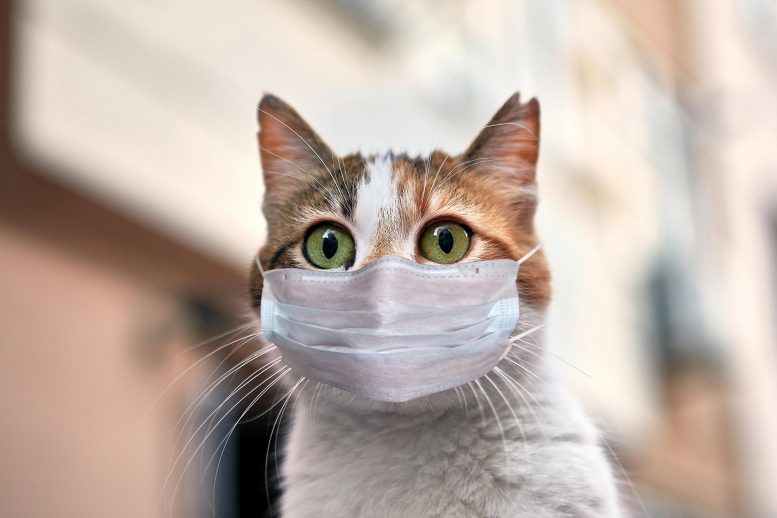COVID-19 Transmission: Researchers Caution About COVID-19 Transmission To Pets And Livestock
Source: COVID-19 Transmission Jun 24, 2020 5 years, 7 months, 4 weeks, 17 hours, 8 minutes ago
COVID-19 Transmission: With new evidence surfacing about the possibility of SARS-CoV-2 infecting various animals, researchers from the University College London (UCL) are warning that say a global effort is needed to reduce the risk of the SARS-CoV-2 coronavirus later returning to people.

A recently published comment piece for
The Lancet Microbe by the researchers warn that if the novel coronavirus becomes common in an animal population that lives near people, such as pets or livestock, there would be a risk that another outbreak could occur even if the virus is eradicated in people in the area.
https://www.thelancet.com/pdfs/journals/lanmic/PIIS2666-5247(20)30069-0.pdf
The researchers call for more research into which animals are susceptible to SARS-CoV-2, the virus causing the Covid-19 disease, and suggest implementing a surveillance program to regularly test animals that could pose the highest risks of transmission.
“Already there is increasing evidence that some animals can catch SARS-CoV-2 from humans, and might subsequently transmit it to other people but we do not know just how much of a risk this is, as it is an area of study that has not yet been prioritized. We need to develop surveillance strategies to ensure we do not get taken by surprise by a large outbreak in animals, which could pose a threat not just to animal health but to human health as well.” said co-author Professor Dr Joanne Santini from the department of Structural & Molecular Biology, UCL.
She added, “Virus transmission in animal populations could become irreversible if left unchecked, and may threaten the success of existing public health measures if people continue to catch the virus from an infected population of animals.”
The researchers wrote that the immense scale of the Covid-19 pandemic compounds the possibility of sufficient animals becoming ‘reservoirs’ of the virus, which could be more likely than for past epidemics, such as the more contained SARS-CoV-1 outbreak in 2002-2003.
Dr Santini and co-author Professor Dr Sarah Edwards (UCL Science & Technology Studies) reviewed evidence from case studies, experiments testing infection in small groups of animals, as well as laboratory and modelling studies describing likely infection mechanisms.
The modelling and lab studies suggest that SARS-CoV-2 could in theory be transmitted to numerous animals, based on findings that the spike protein on the virus attaches to host cells, using a protein that is found in many different species.
The study paper advises that, once scientists identify which animals could become infected, they then need to figure out whether they will become unwell or remain asymptomatic, and whether an infected individual is able to then transmit the virus to other animals or even to humans.
Most importantly, there have been recent cases in the Netherlands of farmed mink becoming infected with SARS-CoV-2, leading to two people catching the virus from these animals, in an outbreak that has led to thousands of mink being culled.
The researchers say this example highlights not only the risk to human health, but also
animal welfare concerns and potential loss of livelihoods in the agricultural sector.
Dr Edwards stressed, “There’s an urgent need for widespread surveillance, by testing samples, preferably non-invasively, from large numbers of animals, particularly pets, livestock and wildlife that are in close proximity to human populations. More laboratory experiments on small numbers of animals are unlikely to give us the evidence needed to be confident that certain species are entirely safe, making major surveillance work the only real option here. We need more information, at the same time as taking simple precautionary measures especially with species which have the potential to spread the virus rapidly in the wild. A robust risk assessment would also require reviewing our ability to manage an outbreak in those animals, namely our ability to isolate, protect, or contain different animals.”
To date they has been documented cases of cats, minks and other animals contracting the SARS-CoV-2 from humans and in past Chinese studies, there were mentions of communities of cats all carrying the novel coronavirus along with cases of humans also contracting it vice versa from the infected animals. This already should raise an alarm but to date no one is really focusing on this perspective of things.
For more about
COVID-19 Transmission, please keep on logging to Thailand Medical News.
HELP! Please help support this website by kindly making a donation to sustain this website and also all in all our initiatives to propel further research: https://www.thailandmedical.news/p/sponsorship
